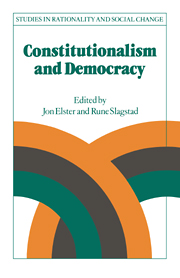Book contents
- Frontmatter
- Contents
- Notes on contributors
- Introduction
- 1 Gag rules or the politics of omission
- 3 Democracy as a contingent outcome of conflicts
- 3 Consequences of constitutional choice: reflections on Tocqueville
- 4 Liberal constitutionalism and its critics: Carl Schmitt and Max Weber
- 5 Democracy and the rule of law: some historical experiences of contradictions in the striving for good government
- 6 Neo-federalism?
- 7 Precommitment and the paradox of democracy
- 8 American constitutionalism and the paradox of private property
- 9 From liberal constitutionalism to corporate pluralism: the conflict over the enabling acts in Norway after the Second World War and the subsequent constitutional development
- 10 Arguments for constitutional choice: reflections on the transition to socialism
- 11 Constitutions and democracies: an epilogue
- Index
3 - Consequences of constitutional choice: reflections on Tocqueville
Published online by Cambridge University Press: 05 June 2012
- Frontmatter
- Contents
- Notes on contributors
- Introduction
- 1 Gag rules or the politics of omission
- 3 Democracy as a contingent outcome of conflicts
- 3 Consequences of constitutional choice: reflections on Tocqueville
- 4 Liberal constitutionalism and its critics: Carl Schmitt and Max Weber
- 5 Democracy and the rule of law: some historical experiences of contradictions in the striving for good government
- 6 Neo-federalism?
- 7 Precommitment and the paradox of democracy
- 8 American constitutionalism and the paradox of private property
- 9 From liberal constitutionalism to corporate pluralism: the conflict over the enabling acts in Norway after the Second World War and the subsequent constitutional development
- 10 Arguments for constitutional choice: reflections on the transition to socialism
- 11 Constitutions and democracies: an epilogue
- Index
Summary
Tocqueville's Democracy in America is, among other things, an argument about the social consequences of constitutions. He draws attention to various features of the democratic constitution he observed in the United States, such as universal suffrage, the system of elected officials, the jury system and freedom of association and of expression. He then goes on to discuss how these institutions have various consequences for certain social values, such as prosperity, happiness and religious faith. His goal is clearly to evaluate democracy, as compared to other arrangements such as despotism, monarchy or aristocracy. For this he needs a method for tracing the full social effect of democratic institutions. It will not do to look at local effects, partial effects, short-term effects or transitional effects. Rather we must see the problem as one of general equilibrium. We must compare democracy as a going concern with other regimes also considered as going concerns.
Tocqueville is not generally considered an important figure in the development of social science methodology. He wrote as an historian, with the historian's peculiar brand of arrogance, which is to make the theories and methods employed as unobtrusive as possible. They serve as scaffolding, useful in construction but not to be left visible in the finished work. Hence posterity has tended to focus on Tocqueville's substantive views, notably his theory of liberty and equality as the main values of modern societies, sometimes in harness with one another, sometimes in conflict.
- Type
- Chapter
- Information
- Constitutionalism and Democracy , pp. 81 - 102Publisher: Cambridge University PressPrint publication year: 1988
- 8
- Cited by

